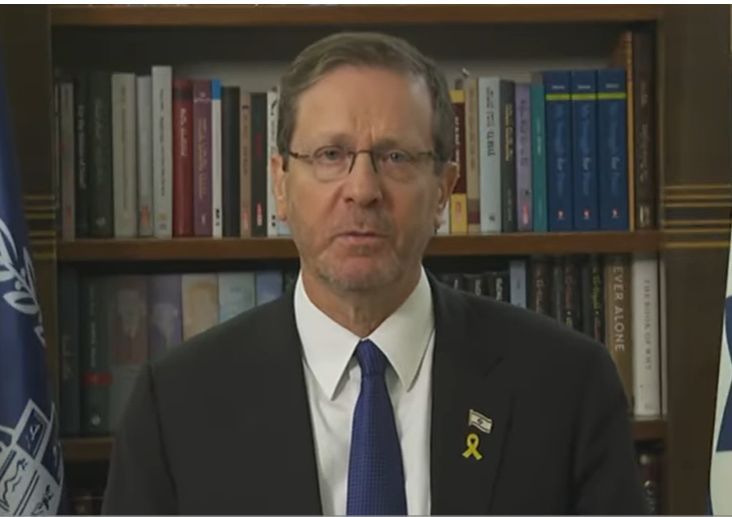On 07.06.2021, Robert Sabadoš, the President of the Federation of Jewish Communities Serbia, gave his view on the current situation in the Middle East, in the light of recent conflicts. The article was published in the column "Pogledi" - daily newspaper "Politika".
Below is the English translation of the entire article.
"It is not easy to explain the oldest and most complicated dispute in the world in a few minutes of a television report or in a few words on Twitter. It is really not easy, but that is precisely why it is very easy to create a superficial, black-and-white image of the alleged perpetrators and victims, of a land of apartheid or of a small country that seems to endanger the human rights of all Arabs on the planet Earth. That is why I do not think that in response to such propaganda and its insulting pattern found in the numerous comments on the latest wave of violence in Israel, a Jewish view of the crisis need to be provided. To understand what happened, what is happening or what is going to happen, it is not necessary to cross (examine) Arabic and Jewish views on the crisis as a whole. I am convinced that just a few irrefutable facts need to be mentioned to completely clear the picture.
The latest wave of conflicts began when the terrorist organization Hamas issued an ultimatum for the Israeli police to withdraw from the part of Jerusalem in the vicinity of the Al Aqsa Mosque. When Israel did not withdraw police from this section of its own capital, Hamas fired more than 3,100 rockets at targets in Israel. I don't know which serious country in the world would agree to ultimatums to withdraw the police from its capital and which country would not respond strongly if terrorists started firing hundreds of rockets a day on its territory. In counting the casualties on both sides, one seems to forget that Israel, after seven decades of endangerment, was forced to invest significant funds in creating an effective defense and to adopt the laws ordering that every building and house must have an atomic fallout shelter.
Numerous conflicts have taken place since the creation of the state of Israel, but none of them have been started by Israel - just a day after the withdrawal of Great Britain and the proclamation of the state of Israel, a war broke out in which the armies of Egypt, Syria, Lebanon, Transjordan, Iraq, Saudi Arabia and Yemen together tried to destroy the newly created state. Between 1948 and today, there have been numerous conflicts, in which Arab countries with incomparably larger populations have attacked Israel on various occasions, while at the same time campaigns have been organized to boycott any business and cooperation with Israeli companies and institutions.
Israel has always been committed to negotiating and finding a lasting diplomatic solution to the Palestinian question (on two occasions, in 2000 and 2008, it offered the creation of a Palestinian state), but it certainly cannot negotiate its own abolition in order to bring peace to the Middle East. Nor can it calmly watch the attacks of Arab terrorist organizations and the countries that support them.
It is simply unbelievable how easily claims are made in numerous “liberal” intellectual circles about the alleged apartheid system in a country that is the only one from Morocco to New Delhi to have an indisputable democratic system. Israel is the only country in the entire region where uncertain parliamentary elections are held, and governments change on the basis of votes, not on the basis of military coups or plots. Palestinian parties, which currently have 15 members in the Knesset, are running in the elections, and will now be part of the new Israeli government for the first time in history. It is interesting that the four-year presidential term of Fatah leader Ahmed Abbas has lasted for 15 years, because the last elections in Palestine were held in 2006.
In that country of "apartheid", the judge of the Supreme Court, of Arab origin, Salim Joubran, convicted the President of Israel Moshe Katsav, and after the removal of Katsav, the acting President of the State of Israel was an Arab, Majalli Wahabi. It is almost inconceivable that judges of the Supreme Court in any Arab country could remove the head of state, unless it is part of a military coup, but it is even more inconceivable that someone of Jewish faith could be elected to the Supreme Court. In Israel, which is described in the propaganda war as a country of apartheid, Nawaf Massalha served as Deputy Minister of Health and Deputy Minister of Foreign Affairs, Reda Mansour was the youngest ambassador of Israel, and the general who was the commander of the forces in the temporarily occupied territories was also of Arab origin.
Speaking about the attitude of a certain part of Serbian elite towards Israeli-Arab relations, we can understand that during communism and the non-aligned movement, part of the population nurtured sympathy for Palestinian leader Yasser Arafat, but it is very difficult to understand that very little is ever said about another Palestinian leader, who, in in the times of tragedy and evil, connected the Jewish and Serbian people incomparably deeper. I am talking about the Grand Mufti of Jerusalem, Mohammed Amin al-Husseini, who was a fanatical supporter of Adolf Hitler (who received the Mufti with great honors in November 1941) and at the same time the founder of the infamous Khanjar Division, for which reason Yugoslavia unsuccessfully sought his extradition to try him for war crimes.
On November 2, 1943, on the anniversary of Balfour declaration approving the creation of the Jewish state, the head of the Nazi military units, Heinrich Himmler, sent Husseini a telegram wishing him luck in the fight against a common enemy - the Jewish invaders. The story of the Jerusalem Mufti, the Palestinian and Arab leaders have never seriously distanced themselves from, is not just a dark episode from the past. After him, the leaders, ideologies, global circumstances have changed, but deep down, the position of many Arab leaders has remained the same - the state of Israel must not survive.
Nowadays, once again, the accusation that the fact that more Palestinians were killed than Israelis proves that the Israeli response is worse than Palestinian terrorism grabs the headlines. The Palestinians have tried to deliberately kill many more Israelis than they have succeeded in doing, while the deaths attributed to Israel are largely accidental, the result of a legitimate effort to stop terrorism. Deliberately hiding in and acting from the residential districts, terrorists use their own civilians as a shield. This is a violation of international law, and civilians who are killed while being used as a shield, under international law, are considered victims of those who used them as a shield, not of those who legitimately tried to attack a particular military target such as an armed terrorist.
Hamas leader Ismail Haniyeh once told the Washington Post: “The Palestinians forced the Israelis to flee because they found their weak point: Jews ... love life more than other people and would rather not die. That is why suicide bombers are the ideal weapon against them." The number of victims alone does not determine the morality or legitimacy of military operations. Yet, Israel's opponents are focusing on the "fact" that leads to the wrong, (misleading) clue - more Palestinians than Israelis fell victim, as Alan Dershowitz noted."
Robert Sabadoš
President of the Federation of Jewish Communities of Serbia





















 Location
Location
